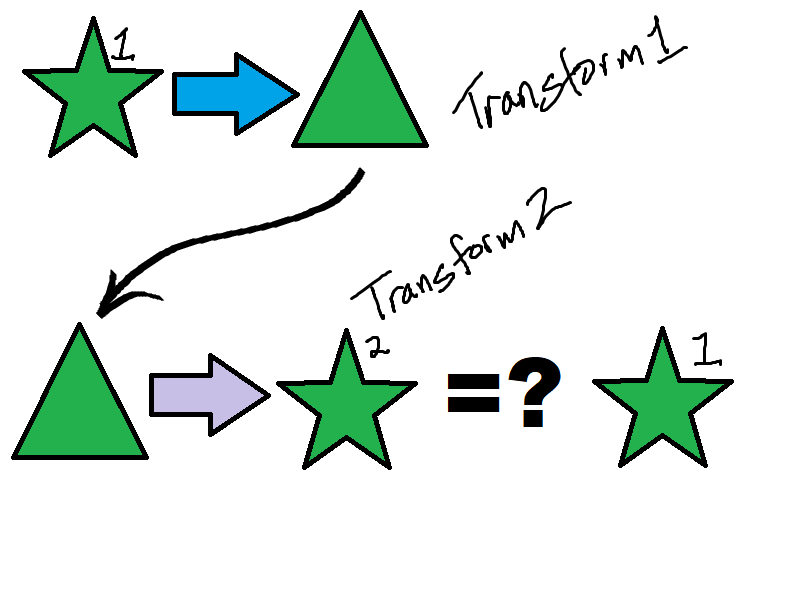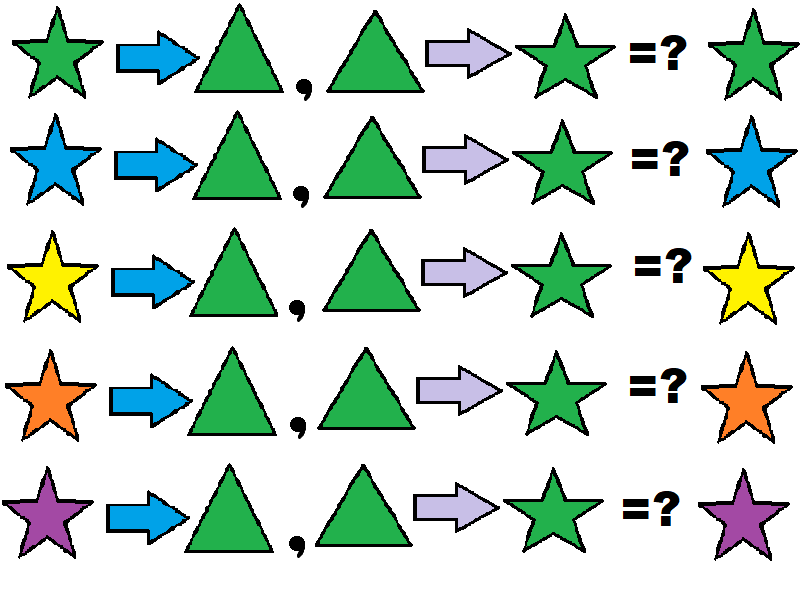Testing Large And Complex Transformations With Round Trips
Testing transformation of complex data using round trips

The illustration above is my own. I found the images from Bing Image Creator unsatisfactory depictions of a machine that turns squirrels into iguanas, so I drew it myself.
Sometimes products transform complex data. The challenge of testing complex data is in the difficulty of anticipating what a correct transformation looks like. We can determine what we believe it would be on a case by case basis, which works well when we have a identified some specifically interesting conditions to check, but it does not work well when we are looking at a very large set of possible transformations and we use something like data generation tools to create the inputs for us. We need faster, generalized testing approaches that can help find problems over large sets of inputs without having to anticipate the exact correct state for all of them.
One technique that works well is round-tripping.
Round Tripping Data Transformations
Round tripping works in the case where the product transforms inputs in both directions, when the transformation can be reversed for at least some set of the input conditions. This is a common functionality, where most conversion libraries have something like “AToB” paired with “BToA”.
The technique assumes a high probability that if one
correctly makes either conversion that a round trip comparison
will yield equivalent values. In other words, X == BToA(AToB(X)).

The technique is not perfect.
This approach only works if the conversion is reversible. If there are multiple possible values for A that map to a single value for B, then the round trip is likely to come back to only a single value of A. This breaks cases where explicit comparison demands an exact equivalence, such as with string inputs.

It also does not detect incorrect between state
conversions that are lost when converting back. For example, if when
executing Y = AToB(X) some extra value was added to Y that was
lost on Z = BToA(Y) and thus a check of X == Z would return
true, even though there was a bug reflected in Y.
Those, and other, limitations aside, what it does do is offer an easy way of checking the transformation of a lot of highly complex data without having to build complex checking mechanisms. It is a simple oracle (a term I picked up from a keynote speech by Harry Robinson at PNSQC one year).
Product Example: Cucumber string conversions
Imagine the following conversion methods for converting back and forth between strings in the Cucumber langage and an object called BDDRuleSet.
Let’s pretend these methods are used in a BDD tool that accepts user inputs as Cucumber, does something with them, and displays sets of BDD rules to the user in Cucumber format.
// given a string in Cucumber 'GIVEN... WHEN...' format, return a BDDRuleSet object
public BDDRuleSet ConvertCucumberStringToBDDRuleSet(string cucumberString);
// given a BDDRuleSet object, return a Cucumber format string
public string ConvertBDDRuleSetToCucumberString(BDDRuleSet bDDRuleSet);
// returns true if ruleSet1 and ruleSet2 have the same value
public bool BDDTools.RuleSetsEquivalent(BDDRuleSet ruleSet1, BDDRuleSet ruleSet2);
Checking the conversion with round-trips
We want to test the above across a large set of possible Cucumber and BDDRuleSet inputs. We write a test method that for each type does a round trip and checks the final output against the original input. We add a few checks along the way to catch problems that might invalidate the whole test:
public void CheckCucumberRoundTrip()
{
// testDocLibrary initialized on test class startup
var testDocs = testDocLibrary.FetchTestFiles(CUCUMBERRULESETFILES);
Assert.AreNotEqual(0, testDocs.Count, $"Fail if we have no test inputs. Filter:{CUCUMBERRULESETFILES}";
foreach(var testDoc in testDocs)
{
var testDocCucumber = testDoc.ReadAllText();
BDDRuleSet ruleSet = BDDTools.ConvertCucumberStringToBDDRuleSet(testDocCucumber);
Log.Information($"In between BDDRuleSet: {ruleSet.ToString()}");
string roundTripCucumber = BDDTools.ConvertBDDRuleSetToCucumberString(ruleSet);
Assert.AreEqual(testDocCucumber, roundTripCucumber, $"fail if testDoc '{testDoc.Filename}' does not round trip to same input.");
}
}
public void CheckBDDRuleSetRoundTrip()
{
// ruleSetRepository initialized on test class startup
var ruleSets = ruleSetRepository.FetchRuleSets(BDDRULESETSAMPLES);
Assert.AreNotEqual(0, ruleSets.Count, $"Fail if we have no test inputs. Filter:{BDDRULESETSAMPLES}";
foreach(var ruleSet in ruleSets)
{
string inBetweenCucumber = BDDTools.ConvertBDDRuleSetToCucumberString(ruleSet);
Log.Information($"In between Cucumber: {inBetweenCucumber}");
BDDRuleSet roundTripRuleSet = BDDTools.ConvertCucumberStringToBDDRuleSet(inBetweenCucumber);
Assert.IsTrue(BDDTools.RuleSetsEquivalent(ruleSet, roundTripRuleSet), $"fail if ruleSet '{ruleSet.ToString()}' does not round trip to same input.");
}
}
The above test methods do not work well on their own. They
rely on trusting that both ConvertBDDRuleSetToCucumberString() and
‘ConvertCucumberStringToBDDRuleSet()’ do a basically correct
transformation. They especially rely on RuleSetsEquivalent() to work correctly.
Checking the checking with round-trips
One way to check RuleSetsEquivalent() would be to alter the same set
of BDDResultSet and check if RuleSetsEquivalent() returns false. We
can also use a round-trip pattern for this check.
public void RuleSetsEquivalent_lotsofrulesets()
{
// testDocLibrary initialized on test class startup
var ruleSets = ruleSetRepository.FetchRuleSets(BDDRULESETSAMPLES);
Assert.AreNotEqual(0, ruleSets.Count, $"Fail if we have no test inputs. Filter:{BDDRULESETSAMPLES}";
int emptyRuleCounter = 0;
foreach(var ruleSet in ruleSets)
{
string inBetweenCucumber = BDDTools.ConvertBDDRuleSetToCucumberString(ruleSet);
if(string.IsNullOrEmpty(inBetweenCucumber) { emptyRuleCounter++};
Log.Information($"In between Cucumber: {inBetweenCucumber}");
BDDRuleSet roundTripRuleSet = BDDTools.ConvertCucumberStringToBDDRuleSet(inBetweenCucumber);
Assert.IsTrue(BDDTools.RuleSetsEquivalent(ruleSet, roundTripRuleSet), $"fail if ruleSet '{ruleSet.ToString()}' does not round trip to same input.");
ruleSet.Rules[0].WhenClause = ruleSet.Rules[0].WhenClause + "_alteration";
inBetweenCucumber = BDDTools.ConvertBDDRuleSetToCucumberString(ruleSet);
Log.Information($"Altered in between Cucumber: {inBetweenCucumber}");
BDDRuleSet alteredRoundTripRuleSet = BDDTools.ConvertCucumberStringToBDDRuleSet(inBetweenCucumber);
Assert.IsFalse(BDDTools.RuleSetsEquivalent(roundTripRuleSet, alteredRoundTripRuleSet), $"fail if altered ruleSet '{ruleSet.ToString()}' round trip is same as unaltered roundtrip.");
}
Assert.AreEqual(0, emptyRuleCounter, "Fail if we have any empty rules. We checked all the others, but there is some test data to correct. Empty count:{emptyRuleCounter}, Total rules: {ruleSets.Count}.");
}
Extending the technique
Imagine we want to go beyond whatever samples we have collected ourselves. Imagine we build a Cucumber randomizer, something capable of emitting random, valid, Cucumber scripts. We could modify the test method as follows:
public void CheckCucumberRoundTrip_1millionrandom()
{
// testDocLibrary initialized on test class startup
for(int i = 0; i < 1000000 ; i++)
{
var testDocCucumber = CucumberRandomizer.MakeRandomCucumberString();
BDDRuleSet ruleSet = BDDTools.ConvertCucumberStringToBDDRuleSet(testDocCucumber);
Log.Information($"In between BDDRuleSet: {ruleSet.ToString()}");
string roundTripCucumber = BDDTools.ConvertBDDRuleSetToCucumberString(ruleSet);
Assert.AreEqual(testDocCucumber, roundTripCucumber, $"fail if does not round trip to same input.");
}
}
The above might give us some false positives if any of the random Cucumber strings convert back to a semantically equivalent, but maybe exact string different input. That kind of problem is difficult with string input. We could change it up with a fuzzer instead.
public void CheckCucumberRoundTrip_fuzzedcucumbersroundtriptooriginal()
{
// testDocLibrary initialized on test class startup
var testDocs = testDocLibrary.FetchTestFiles(CUCUMBERRULESETFILES);
Assert.AreNotEqual(0, testDocs.Count, $"Fail if we have no test inputs. Filter:{CUCUMBERRULESETFILES}";
foreach(var testDoc in testDocs)
{
// make a fuzzed version of each of the inputs
for(int i = 0; i < 100; i++)
{
string testDocCucumber = testDoc.ReadAllText();
string fuzzyCucumber = TestTools.CucumberFuzzerToSimilarString(testDocCucumber);
Log.Information($"fuzzyCucumber:{fuzzyCucumber}");
BDDRuleSet ruleSet = BDDTools.ConvertCucumberStringToBDDRuleSet(testDocCucumber);
Log.Information($"In between BDDRuleSet: {ruleSet.ToString()}");
string roundTripCucumber = BDDTools.ConvertBDDRuleSetToCucumberString(ruleSet);
Assert.AreEqual(testDocCucumber, roundTripCucumber, $"fail if testDoc '{testDoc.Filename}' variation{i} does not round trip to original input.");
}
}
}
This method works on the assumption that the prior check, RuleSetsEquivalent_lotsofrulesets
passes if all the values in ‘CUCUMBERRULESETFILES’ round trip to the
same input string. We also rely on CucumberFuzzerToSimilarString() to fuzz
an output in a way that ought to create the same BDDRuleSet as its input string.
We would have to build those libraries, but that is why test
engineering is interesting. When we use these kinds of patterns we rapidly expand what
we can cover.
The return trip
Round-tripping data transformation is an example of a simple oracle. Simple oracles tend to be patterns of checking results that might not be perfect, but they tend to be automatic in nature, allowing us to check very difficult conditions rapidly and over a lot at once. Whenever I am confronted with a difficult test problem, especially one where automation might make generating the test condition easier, but checking the test condition more difficult, I search for simple oracles. Round tripping is one I use quite a lot.